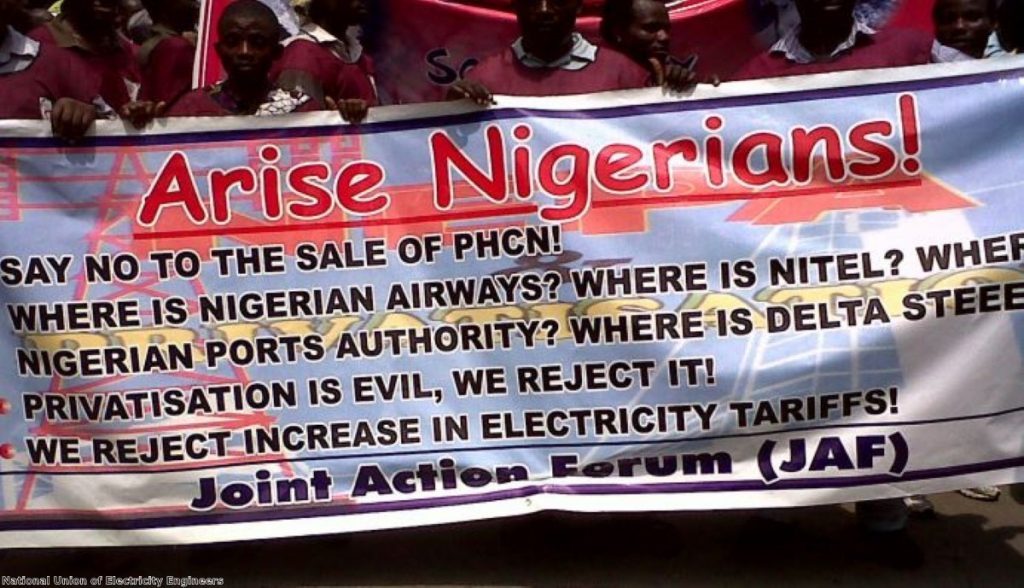Comment: How Britain’s aid budget pays for the privatisation of energy in Nigeria
By Christine Haigh
Last week's Budget comes hot on the heels of the news that the coalition government's pledge to spend 0.7% of the UK's national income as overseas aid has finally made it into law (pending royal sign-off). It's welcomed by anti-poverty campaigners as a means of redistributing the grossly unequal manner in which the world's resources are currently divided. At least in theory. But how does it measure up in practice?
While there are undoubtedly many projects funded with UK aid that bring genuine and much-needed benefit to people living on the lowest incomes in the world, there's also a trend in ones that actually help tilt an already uneven playing field further in favour of the rich, entrenching inequality and corporate power.
Nigeria, one of the countries that receives the most UK aid, is a good place to see this play out. Only 40% have access to electricity. So the Department for International Development is backing a project overseeing wholesale privatisation of the country's power sector, despite saying that goal is "seen by many as being so ambitious as to be unrealistic".


The project in question is the Nigerian Infrastructure Advisory Facility (NIAF) which is currently in its second phase, having spent its initial £33 million budget ahead of schedule. Now a further £100 million has been authorised.
The UK's own experience of energy privatisation should be enough to set a few alarm bells ringing. Millions of families have been pushed into fuel poverty by bills that have risen eight times faster than wages, while the Big Six energy companies pocket billion-pound profits. Energy corporations are used to peddling the line that we can either have cheap energy or green energy. But in fact, under privatisation, we've got neither. Our electricity supply remains stubbornly hooked on fossil fuels, which still account for around two-thirds of our supply.
But these problems pale into insignificance when compared to Nigeria's experience, less than 18 months after privatisation. There too Nigerians have seen major price rises, the latest being 29% in Lagos. There is no doubt that massive price hikes were built into the process. As early as 2012, the FT reported that prices would increase by up to 88% as part of the efforts to attract private investors.
In fact, the only investment that has materialised has been from the Nigerian government. The Nigerian central bank had to provide a bailout for the newly privatised energy companies last year after investment flows into the sector dried up. As Igwebike Dominic, assistant general secretary of the National Union of Electricity Employees (NUEE), which has been fighting the privatisation programme, puts it: "Can you imagine a landlord sells their property to someone else, and then uses the money from the sale to paint, furnish and upgrade the house for the new owner? This is what the Nigerian government is doing."

Members of Igwebike's union have paid heavily for the privatisation programme, and not just through their electricity bills. Many households are clamouring for prepayment meters because the newly privatised companies are so poor at conducting meter readings and often over-estimate bills.
Around a quarter of the workforce, about 10,000 people, were made redundant following privatisation. When questioned about this, the UK's Department for International Development claims that the Nigerian government has provided compensation for those workers that have lost their jobs, and set up a retraining scheme. But the NUEE says they have heard nothing about this programme and describes how many workers have not received pensions or redundancy benefits that they are entitled to.
Given the scale of job losses, it's hardly surprising to hear reports that electricity generating capacity has actually been reduced, with several power stations experiencing shutdowns due to poor management. Nigerians that are connected to the grid report frequent blackouts, to the extent that last year the regulator was forced to agree that the newly-introduced standing charge would not be payable by people who experience 15 or more days of continuous interruption to their power supply. And it has been reported that the Nigerian government has had to budget N837m (around £2.5 million) last year for fuelling and maintaining generators for its offices in 2014 as a result of being unable to rely on the national grid for power.
With the vast majority of the NIAF project's budget being spent on international consultants, not on new power stations or connections to link poor communities to the grid, it's difficult to imagine a more disastrous use of aid money. As Ken Henshaw, senior programmes officer at Nigerian civil society group Social Action, sums it up: "Regardless of whether or not the privatisation process leads to better power supply, the truth is that with the recent frightening increases in the cost of electricity, the vast majority of Nigerians won't benefit from it as they can't afford it. Sixty-seven per cent of the people in Nigeria live on less than $1.25 a day. So you have to ask the question, who is benefitting from the privatisation of energy in Nigeria, as it's certainly isn't the people of Nigeria?"
While we should welcome a commitment to providing fairer quantities of aid, it is meaningless unless we ensure it is of a quality that genuinely reduces poverty and inequality, rather than simply exporting failed neoliberal approaches.
Christine Haigh is a policy and campaigns officer for Global Justice Now's energy and climate change campaign
The opinions in Politics.co.uk's Comment and Analysis section are those of the author and are no reflection of the views of the website or its owners.












